

| WB | 咨询技术 | Human,Mouse,Rat |
| IF | 咨询技术 | Human,Mouse,Rat |
| IHC | 1/25-1/100 | Human,Mouse,Rat |
| ICC | 技术咨询 | Human,Mouse,Rat |
| FCM | 咨询技术 | Human,Mouse,Rat |
| Elisa | 1/2000-1/5000 | Human,Mouse,Rat |
| Aliases | FIC; MARC; MCP3; NC28; MCP-3; SCYA6; SCYA7 |
| Host/Isotype | Rabbit IgG |
| Antibody Type | Primary antibody |
| Storage | Store at 4°C short term. Aliquot and store at -20°C long term. Avoid freeze/thaw cycles. |
| Species Reactivity | Human |
| Immunogen | Synthetic peptide of human CCL7 |
| Formulation | Purified antibody in PBS with 0.05% sodium azide and 50% glycerol. |
+ +
以下是关于CCL7抗体的参考文献示例(虚构内容,仅作格式参考):
1. **"CCL7 Neutralizing Antibody Attenuates Breast Cancer Metastasis by Inhibiting Macrophage Recruitment"**
*Authors: Smith A, et al.*
**摘要**:研究证明CCL7抗体通过阻断肿瘤微环境中巨噬细胞的趋化作用,显著减少乳腺癌小鼠模型的肺转移,提示靶向CCL7可能成为癌症免疫治疗新策略。
2. **"Targeting CCL7 in Neuroinflammation: Antibody-Based Therapy Reduces Microglial Activation"**
*Authors: Chen L, et al.*
**摘要**:在阿尔茨海默病模型中,CCL7中和抗体降低了小胶质细胞活化和促炎因子释放,改善小鼠认知功能,表明其在神经退行性疾病中的治疗潜力。
3. **"CCL7 Blockade Suppresses Viral Myocarditis via Modulating T Cell Trafficking"**
*Authors: Tanaka K, et al.*
**摘要**:使用CCL7抗体抑制病毒感染后心肌组织的T细胞浸润,减轻小鼠心肌炎病理损伤,为病毒性心脏疾病提供干预靶点。
4. **"Anti-CCL7 Antibody Ameliorates Skin Fibrosis in Systemic Sclerosis Models"**
*Authors: Müller R, et al.*
**摘要**:在系统性硬化症模型中,CCL7抗体通过减少成纤维细胞活化和胶原沉积,显著缓解皮肤纤维化,提示其治疗纤维化疾病的可行性。
(注:以上文献为模拟生成,实际研究需通过数据库如PubMed检索确认。)
CCL7 (C-C motif chemokine ligand 7), also known as monocyte chemoattractant protein-3 (MCP-3), is a small secreted protein belonging to the CC chemokine family. It plays a critical role in immune regulation by recruiting monocytes, lymphocytes, dendritic cells, and eosinophils to sites of inflammation or injury through interactions with receptors such as CCR1. CCR2. and CCR3. CCL7 is implicated in various pathological processes, including cancer progression, autoimmune diseases, and chronic inflammatory conditions, due to its ability to modulate immune cell infiltration and activation.
Antibodies targeting CCL7 are essential tools for studying its biological functions and therapeutic potential. These antibodies are commonly used in research applications like ELISA, Western blotting, immunohistochemistry, and flow cytometry to detect CCL7 expression levels or neutralize its activity in experimental models. In cancer, CCL7 antibodies help investigate tumor microenvironment interactions, particularly how CCL7 promotes metastasis by attracting immunosuppressive cells or facilitating angiogenesis. In autoimmune disorders, such as rheumatoid arthritis or multiple sclerosis, blocking CCL7 signaling may reduce pathogenic inflammation.
The development of CCL7-specific antibodies also holds therapeutic promise. Preclinical studies explore their use in inhibiting chemokine-driven immune dysregulation, potentially offering targeted treatments for diseases with overactive CCL7 pathways. However, challenges remain in optimizing specificity and minimizing off-target effects. Overall, CCL7 antibodies serve as vital reagents for both mechanistic research and the development of novel immunomodulatory therapies.
×